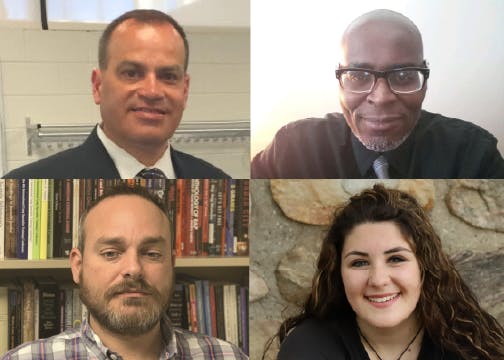The group has 10 members, as well as one city staff liaison. Of the members, four agreed to share their background, ideas and goals as they begin their new positions.
Chuck Grigsby, community advocate
Chuck Grigsby said social work has always been a part of his life.
"I grew up in a situation in the projects of Kansas City, Missouri," Grigsby said. "... My first interaction with a police officer was when I was a kid. I was about six, seven years old."
Grigsby said his first interactions with law enforcement were positive. Local police would hand out football cards in his neighborhood.
"In so many situations in the youth that I've come across and the people that I've dealt with, their first interaction with police is definitely opposite of that," Grigsby said. "So for me, having that foundational piece of what officers are capable of, I've always appreciated them and appreciated how difficult the job is."
When Grigsby moved to Iowa his experience with law enforcement changed.
"I started to have these very, very visceral, negative interactions with police and I wasn't a kid who was associated with crime or doing anything," Grigsby said. "It was just really the circumstance."
While living in Iowa, Grigsby realized the disruption and mistrust between the community and police.
Grigsby majored in criminal justice at Grand View University and went on to have a career in MMA fighting. He settled in East Lansing, where his wife is from, about four years ago.
At that time, Grigsby realized the law enforcement issues that concerned him when he was younger were worse.
"I wanted to do something about it. I wanted to be able to advocate for those that I saw," Grigsby said.
To begin his advocacy, Grigsby joined the East Lansing Human Relations Commission (HRC) and participated in the Emerging Leaders Program.
While working with the HRC, Grigsby said the committee realized there had been a history of police complaints. He said the other members and he became interested in creating a commission that was proactive when it comes to complaints, rather than reactive after they happen.
Grigsby mentioned George Floyd and Jonathan Price as examples for needing police oversight.
"It's just the balance of violence to public safety and protecting the community," Grigsby said. "It's important to have oversight commissions to ... be preventative in my humble opinion and to address these things before they end up being the outcomes that they are," Grigsby said.
Grigsby said his personal goal is to change his reputation as a professional MMA fighter to one of a community representative.
"We're at a time right now, in our history, where I think a lot of people will look back upon this time period and think about the people who were involved, what they were doing, and what they weren't doing when it comes to the social issues, community complex problems that we have, and who was stepping up to the plate," Grigsby said. "And I'd like to humbly say that I would like my family and my people that believe in me to know I was advocating for the greater good."
Support student media!
Please consider donating to The State News and help fund the future of journalism.
Helen Josephson, MSU criminal justice student
Helen Josephson studies criminal justice at MSU and was a part of the University Student Commission in East Lansing last year. Additionally, Josephson has worked with the MSUPD parking division.
"I think some topics I want to talk about is obviously the use of force, when it's necessary, how it should be used, what extent, what are the situations it might not need the use of force," Josephson said.
Additionally, Josephson said she wants to focus on a positive relationship between the community and police.
"It's very easy to see the media and panic that a lot of police officers are bad or they're all against us," Josephson said. "And I feel like that is not necessarily the case, but it needs to be reinforced that they're there for us."
The committee can be a bridge between locals to communicate with police and a police response, Josephson said.
Noel Garcia, retired Lansing Police Department lieutenant, instructor and community policing advocate
Noel Garcia retired from Lansing Police Department (LPD) about six years ago and jumped into a new job a week later. Currently, Garcia is the law enforcement instructor at the Wilson Talent Center.
As an undergraduate student at MSU, Garcia worked with Terry Curry to revamp the disciplinary process at LPD for fair treatment of minority officers.
At LPD Garcia focused on diversifying the police force in his position of recruitment and retention.
"The chief at that time allowed me to initiate some strategies that I had come up with in my plan," Garcia said. "And that was beginning a recruiting task force with the goal of bringing minority officers and female officers in the field."
In his time at LPD, Garcia created a police citizens complaint board.
"I've always felt that citizens should have a say in reviewing discipline, reviewing misconduct complaints against police officers and having a say in how the outcome should be." Garcia said.
Garcia has stayed in the field of law enforcement; however, rather than being a part of it he instructs those with a future in police work.
"I think I can bring the commission some background in having fulfilled a career in law enforcement that many on the commission wouldn't have had those experiences, but understanding I'm still a huge advocate in fair treatment of citizens," Garcia said.
Additionally, Garcia has worked in community policing.
In his work with the committee, Garcia hopes to have more community input in how police handle complaints. He also hopes to see ELPD continue to hire a diverse workforce.
"I'd like to see the city of East Lansing do more with community policing," Garcia said. "I think because of budget cuts and everything those are one of the first things that end up going."
Seven years ago, Garcia's family moved to East Lansing for more diversity. He said, at that time, there seemed to be more community policing programs.
"I think a lot of the attitudes have been pretty negative with some of the bad publicity or bad press that they've gotten, and some of it (is) justifiable," Garcia said. "... I see that when I run into some of the officers, they seem to be not in really good moods, and they've taken a beating."
Garcia said ELPD needs to spotlight the good things officers are doing.
"I know they're doing great things out there, but we never hear about those. All we hear about is the misconduct and so the citizens get a thwarted look at what the police department is really like," Garcia said.
Cedrick Heraux, associate professor of criminal justice
Currently, Cedrick Heraux is an associate professor in the field of sociology and criminal justice at Adrian College.
Heraux is originally from New York; however, he came to MSU to pursue a doctorate degree in criminal justice. For his dissertation, he focused on police use of force.
Heraux lived in East Lansing for 15 years; however, he now resides in Mason, Michigan.
"The East Lansing area has sort of been my community the entire time that I've been here, and so I saw this (the committee) as an opportunity to combine my academic expertise, while giving back to a community that is important to me," he said.
Complaints can be issued against police for a range of reasons other than use of force, Heraux said.
"I think the commission's main focus is really to look at what we academically refer to as procedural justice," Heraux said. "Which is this idea that whatever it is we want the police to do, it needs to be done in a manner that is fair. The authority that the police have to take our freedoms away, to arrest us, to use violence against us, that authority stems from basically this agreement that we the public have made."
Heraux said the agreement is that police keep community members safe in order to have power. The committee will look at if ELPD is holding up its end of the agreement.
"From research on procedural justice, one of the things we find that is actually really important is that process tends to matter more than outcome," Heraux said. "By that I mean a lot of people who call the police don't necessarily expect an arrest to be made, but when the police show up they want police to take things seriously, to deal with the matter fairly and then resolve it in some way."
Complaints are generated by a violation of fairness, Heraux said. His goal is to focus on the procedural aspect of complaints while working with the commission.
A significant number of people do not file complaints because they don't think they will be heard, Heraux said. Even if their complaint is heard, they may think nothing will happen in response.
"We want to sort of reassure people that if you have a legitimate complaint against a police officer, it is something that will be heard and there will be consequences for that," Heraux said.
The study committee will hold its first meeting virtually at 6 p.m. on Monday. Meetings will happen on the second and fourth Monday of each month.
Discussion
Share and discuss “EL police oversight study committee members weigh in before first meeting” on social media.








